

Critical Friends: Building a Culture of Collaboration. "… a critical friend is someone who is encouraging and supportive, but who also provides honest and often candid feedback that may be uncomfortable or difficult to hear.
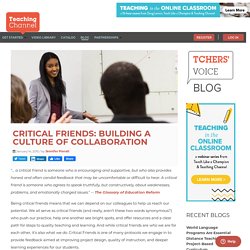
A critical friend is someone who agrees to speak truthfully, but constructively, about weaknesses, problems, and emotionally charged issues. " -- The Glossary of Education Reform Being critical friends means that we can depend on our colleagues to help us reach our potential. We all serve as critical friends (and really, aren't these two words synonymous?) Who push our practice, help one another see bright spots, and offer resources and a clear path for steps to quality teaching and learning.
And while critical friends are who we are for each other, it's also what we do. Why we give feedback A phrase that I often hear in my work supporting schools is "the culture of the students will never exceed the culture of the adults in a building. " David A. Kolb on experiential learning. – infed.org: Contents: introduction · david a. kolb · david kolb on experiential learning · david kolb on learning styles · issues · developments – jarvis on learning · a guide to reading · links · how to cite this piece As Stephen Brookfield (1983: 16) has commented, writers in the field of experiential learning have tended to use the term in two contrasting senses.
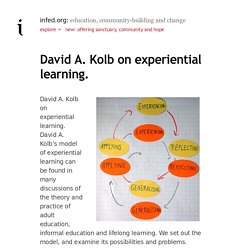
On the one hand the term is used to describe the sort of learning undertaken by students who are given a chance to acquire and apply knowledge, skills and feelings in an immediate and relevant setting. Experiential learning thus involves a, ‘direct encounter with the phenomena being studied rather than merely thinking about the encounter, or only considering the possibility of doing something about it.’ (Borzak 1981: 9 quoted in Brookfield 1983). Learn a language. Meet the world. Teaching Effectively During Times of Disruption. PeerStudio: the peer feedback and assessment tool that helps students learn. 12.11 Step nine: evaluate and innovate – Teaching in a Digital Age – Second Edition.
The last key ‘fundamental’ of quality teaching and learning in a digital age is evaluation and innovation: assessing what has been done, and then looking at ways to improve on it (for a more in-depth discussion of the issues involved in evaluating online learning, see Gunawardena et al., 2000) 12.11.1 Why evaluation is important.
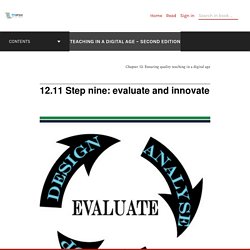
Centre for Innovation in Learning and Teaching. You Have To Put Your Class Online: Simple Things to Think About. Home learning support for families. "Pecha What?" Exploring Pecha Kucha as Formative Assessment - Royal Holloway Staff Intranet. I designed and delivered a 3rd year undergraduate module titled Global Marketing that ran at the School of Management for the first time in the spring term 2016.
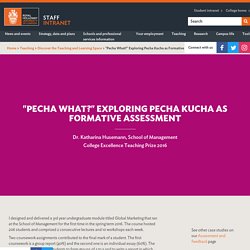
The course hosted 206 students and comprised 2 consecutive lectures and 10 workshops each week. Two coursework assignments contributed to the final mark of a student. The first coursework is a group report (40%) and the second one is an individual essay (60%). Morag Myerscough Video Presentation: We Love Our Heroes. Project Audio: Teaching Students How to Produce Their Own Podcasts. Invisibilia: Episode 1: Dark Thoughts (Segment: 0:00 - 2:40) The Daily: Fired Over an Instagram Post (Segment: 0:00 - 3:45) StoryCorps: Gregory Bess and April Gibson (Segment: 0:00 - 2:36) For “The Daily” episode, students might notice that the interview questions are sometimes edited out — so the listener just hears the interviewee’s responses.
Students might even guess what the missing questions were. Then regroup as a class. What interviewing techniques did you hear? Teaching intelligence: how to take your classes online. When the novel coronavirus first hit Singapore in January, universities were two to three weeks into a new semester.
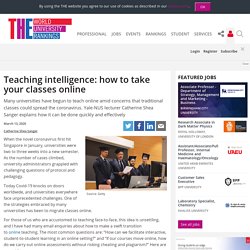
As the number of cases climbed, university administrators grappled with challenging questions of protocol and pedagogy. Today Covid-19 knocks on doors worldwide, and universities everywhere face unprecedented challenges. One of the strategies embraced by many universities has been to migrate classes online. Don't 'just Google it': 3 ways students can get the most from searching online.
Searching online has many educational benefits.

For instance, one study found students who used advanced online search strategies also had higher grades at university. But spending more time online does not guarantee better online skills. Instead, a student’s ability to successfully search online increases with guidance and explicit instruction. Young people tend to assume they are already competent searchers. Their teachers and parents often assume this too. The Difference Between Emergency Remote Teaching and Online Learning. Well-planned online learning experiences are meaningfully different from courses offered online in response to a crisis or disaster.
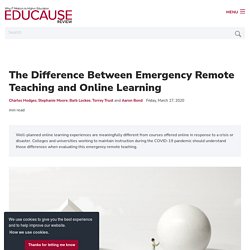
Colleges and universities working to maintain instruction during the COVID-19 pandemic should understand those differences when evaluating this emergency remote teaching. Due to the threat of COVID-19, colleges and universities are facing decisions about how to continue teaching and learning while keeping their faculty, staff, and students safe from a public health emergency that is moving fast and not well understood. Many institutions have opted to cancel all face-to-face classes, including labs and other learning experiences, and have mandated that faculty move their courses online to help prevent the spread of the virus that causes COVID-19. The list of institutions of higher education making this decision has been growing each day. Project Based Online Learning: Meeting the Challenge. Project Based Learning (PBL) has made a mark in traditional face-to-face classrooms.
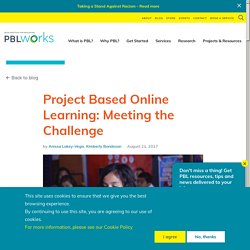
There is no shortage of evidence showing the beneficial impact of project-based learning on student outcomes. However, this progressive instructional strategy has yet to be adapted to work in conjunction with the advancements in blended and online education. Still, PBL is likely an ideal model of student-centered learning for blended and online environments, because these environments provide additional flexibility in time and space--two resources highly-valued, yet often limited, in the face-to-face classroom. Still, effective PBL in the online or blended classroom depends on teacher ability to design high-quality online content.
Liveworksheets.com - Interactive worksheets maker for all languages and subjects. Bloom's Taxonomy for Learning Outcomes - Learning Outcomes Assessment - Undergraduate Studies - The University of Utah. FutureLearn How to Teach Online: Chunking a taught session. Design and Develop an Online Course. Lesson Plans - Welcome to Willis ELT. If you want us to tell you about new lessons as we post them please send us an email.

NEW: Three lessons based on written texts at the intermediate level. All of these lessons begin with a prediction task learners are given clues and are asked to predict the content of a story based on the clues. The lessons then go on to do some detailed language work. Lesson 1: I’ve just jumped off the Empire State Building. Course Design: Planning a Flipped Class. The 6 Learning types – ABC Learning Design. Glossaire Digital Learning : le Jargon du Elearning rendu plus simple. Comprendre chaque terme, chaque sigle est une étape indispensable dans l’apprentissage de n’importe quel sujet. Nous avons créé pour vous un ensemble de définitions simples de tout le vocabulaire lié au digital learning. Le temps passé à étudier ce vocabulaire est un investissement rentable pour passer d’un état où vous vous sentez “largué” sur un sujet, à un état d’esprit où vous maitrisez les fondements du domaine. Nous proposons un service visant à vous aider à créer un glossaire (lexique, dictionnaire…) intégré a tous vos dispositifs de digital learning.
Vous pouvez chercher un mot via l’alphabet ci-dessous et vous verrez également que dans tous notre site, les définitions de ce lexique apparaissent en pop-over (quand la souris passe dessus…). C’est top ! Two Tips to Increase Students' Use of Office Hours. Remote teams use Zoom and Kahoot! to strengthen their culture. Today, with remote work becoming the temporary default, team culture is more important than ever for morale, productivity, and a sense of connection.
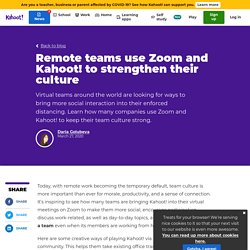
It’s inspiring to see how many teams are bringing Kahoot! Into their virtual meetings on Zoom to make them more social, encourage participation, discuss work-related, as well as day-to-day topics, and reinforce the feeling of a team even when its members are working from home. Here are some creative ways of playing Kahoot! Via Zoom shared by the community. This helps them take existing office tradition online, as well as come up with some new ones: LinkedIn connected 50 people across several continents into a virtual quiz. Play and Learn: 10 Fun and Educational Business English Vocabulary Games. Why bother learning many different words to describe the exact same thing?
Isn’t one word more than enough? When I was younger, I didn’t see the point of developing a vocabulary. Then my parents and teachers introduced me to vocabulary games. Suddenly, learning English was no longer a challenge—it was fun, entertaining and even exciting. Creative Methods of Assessment in Online Learning - Center for Teaching and Learning. Typically when students and instructors hear the word assessment, they think of a long, arduous exam (or a long, repetitive night of grading!). However, an assessment can be any task or activity that evaluates students’ progress toward your course’s learning outcomes.
Traditional examples include papers, projects, reflective journals, group work, quizzes, and much more. Online learning has broadened the possibilities of assessment even further because it gives you, the instructor, a wide variety of tools that you can use to help students interact with material in new and exciting ways. Here are some strategies for thinking more creatively about assessments in your course, including examples from actual online courses. Capitalize on digital resources. Engaging students through online activities. IDDblog: Instructional Design Tips, Advice, & Trends for Online & Distance Learning. When we try to replicate classroom experiences in an online environment, it’s easy to think of video conferencing as our go-to tool for all sorts of learning objectives—and for good reason.
Most of us have participated in a video conference at work or had a video chat with friends or family at some point. We like the idea of being able to see and hear our students while interacting with them in real time just like we do when teaching face to face. But there are two key factors that make this approach problematic. 1. Bandwidth. 403 Forbidden. Viewer - Learning Designer. Name FutureLearn How to Teach Online: Who are my students and how can I support and engage them from the start? FFP March2020 Topic FutureLearn How to Teach Online: Who are my students and how can I support and engage them from the start? Learning time 20 minutes. The Importance of Building Community in Online Classes. Taking an online course should be more than sitting in front of a computer — real engagement involves becoming a part of the community of learners. Supporting online students. What is digital literacy? - Digital literacy - WBQ National: Foundation KS4 Revision - BBC Bitesize.
Autonomy. Skip to content Autonomy means the ability to take control of one's own learning, independently or in collaboration with others. Create a group & choose group settings - Google Groups Help. You can use Google Groups to create an online group for your team, organization, class, or other group to do things like: Email each other Host group discussions Collaborate on projects Organize meetings Find people with similar hobbies or interests You can also change your group's type, name, or description, and choose who can join, post, and view topics. Northstar Digital Literacy. Developing digital literacies. Moodle. Digital literacies are those capabilities which fit an individual for living, learning and working in a digital society. Digital literacy looks beyond functional IT skills to describe a richer set of digital behaviours, practices and identities.